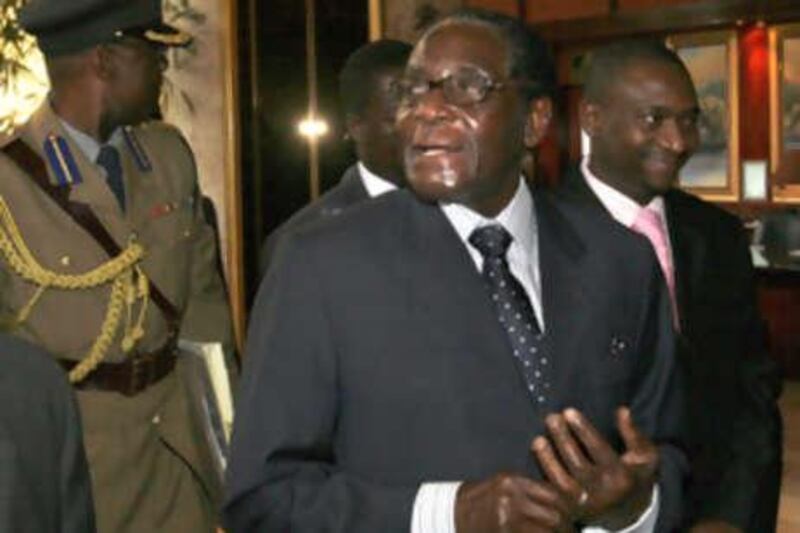JOHANNESBURG // Even in the early hours of the morning Tomaz Salomao, the Mozambican who is executive secretary of the Southern African Development Community, remains dapper and diplomatic. After several hours of talks on Zimbabwe's power-sharing crisis by the region's leaders and their representatives at an emergency summit in Johannesburg - while their delegation members dozed in the corridors and wandered around a neighbouring shopping mall - Mr Salomao took his seat in a corner of a cavernous hall to reveal their conclusions.
Robert Mugabe's Zanu-PF and the Movement for Democratic Change, led by Morgan Tsvangirai, had been at loggerheads for weeks over control of the ministry of home affairs, which brings with it authority over the police and which the octogenarian leader had unilaterally allocated to his own party. "Roman one: Summit decided that the inclusive government be formed forthwith in Zimbabwe," Mr Salomao said. "Roman two: the ministry of home affairs be co-managed between the Zanu-PF and MDC-Tsvangirai."
It sounds like an anodyne, even reasonable, compromise in the circumstances. In reality it has plunged the power-sharing process into its worst crisis yet and left SADC, which has been mediating it, looking impotent and ineffective, a savage exposure of the much-vaunted concept of "African solutions for African problems". The MDC is adamant that without sole charge of the home ministry, the power-sharing is a sham. It has a point - human rights groups estimate that almost 200 people, the vast majority of them opposition supporters, were murdered in the run-up to the second round of the presidential election in June.
Without jurisdiction over some of the law and order apparatus of the state, it will be next to impossible to persuade its voters that their safety can be assured. If there are two ministers, the police - whose commander Augustine Chihuri has said he will not obey orders from anyone without liberation credentials, a reference to Mr Tsvangirai - can be expected to defer to the Zanu-PF representative whenever there is a conflict.
"The MDC has very difficult choices to make," said Sydney Masamvu, a Zimbabwe specialist with the International Crisis Group. The opposition party's hierarchy is meeting this week to decide on its next move, but Mr Masamvu said that whatever it did, the unity government was doomed. "Morgan Tsvangirai is marginalised before he even enters so really there's nothing which should whet his appetite to go into this government," he said, adding that doing so would only legitimise Mr Mugabe as president.
"The impasse is a foretaste of greater things to come. If people can haggle for two months about the allocation of cabinet posts, what about radical policy changes? "It's a clear indication that this inclusive government is going to be dysfunctional from day one, even if it is formed. With Mugabe in the mix, this thing is not going to work. His powers are virtually intact. It is dead on arrival, it is stillborn."
The summit's refusal to confront Mr Mugabe, and the fact that only five of the organisation's 15 members were represented at the head of state level, were indications that "all SADC leaders in their heart of hearts know this thing is dead", Mr Masamvu said. "No one was ready even to try to push. "If there was any doubt that the concept of African solutions for African problems is mere rhetoric, this drives that point home. It's just a question of political self-preservation. It really hits their credibility and it's an indictment of African institutions."
Hopes had been raised before the gathering that the presence of Kgalema Motlanthe, South Africa's new president, in place of Thabo Mbeki, his predecessor, who was often criticised for his policy of "quiet diplomacy" and accused of being too close to Mr Mugabe, would herald a change of approach. They were bolstered by official pronouncements that a "tough line" would be taken, but in the event pressure was applied largely in one direction only.
Judy Smith-Höhn, a senior researcher with the Institute of Security Studies in Pretoria, pointed out that as an elder statesman and a hero of the struggle for independence, one of the last still in government in Africa, Mr Mugabe, 84, has a status that makes him difficult for his fellows to confront. "Big men still do carry quite a bit of importance for some people," she said. "He still enjoys that respect."
That thinking is amply represented within SADC, Ms Smith-Höhn said, citing September's "big farce" of a general election in Swaziland, where political parties cannot take part and parliament is effectively powerless. It is a challenge for the MDC to overcome such an outlook, she said. "If you look at the dynamics within their own countries they themselves are not necessarily very open to opposition."
sberger@thenational.ae





